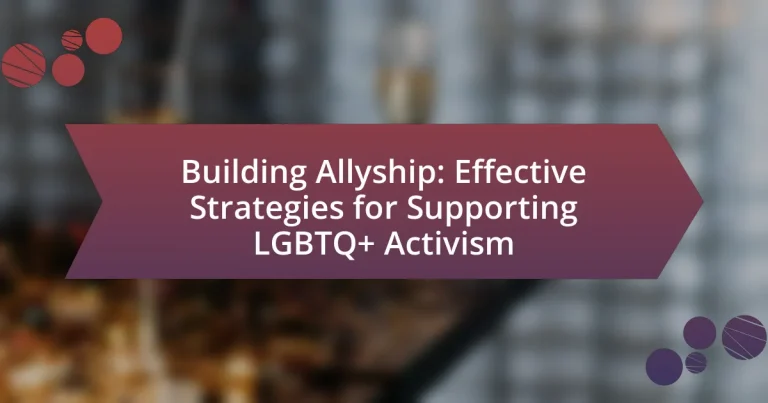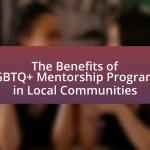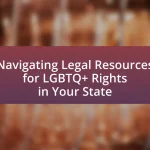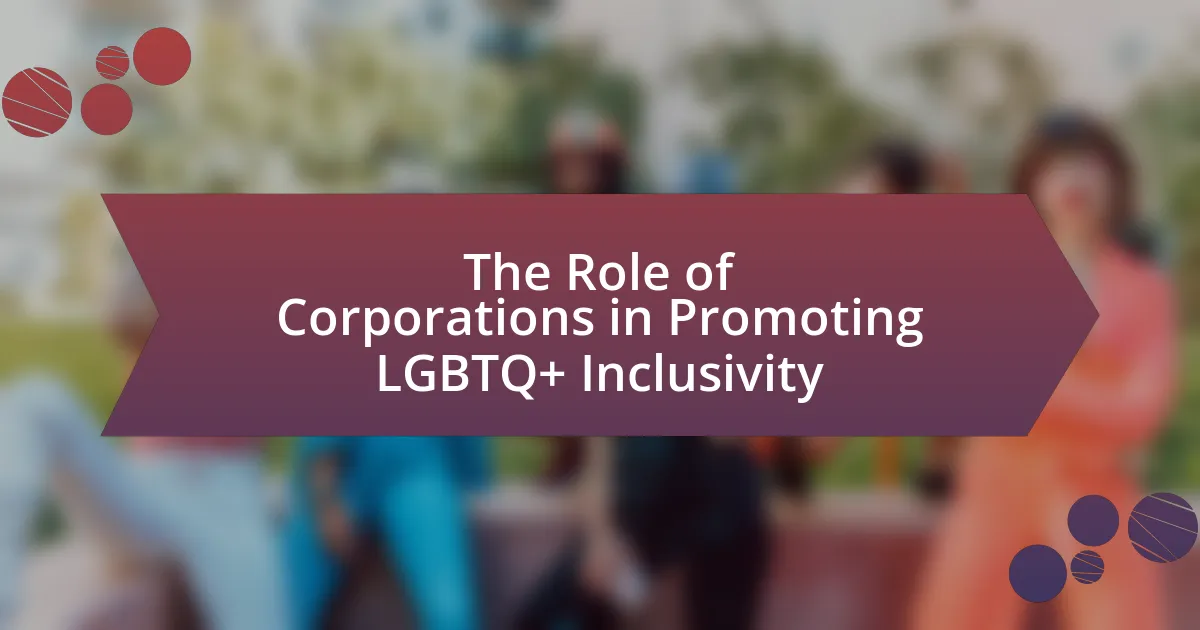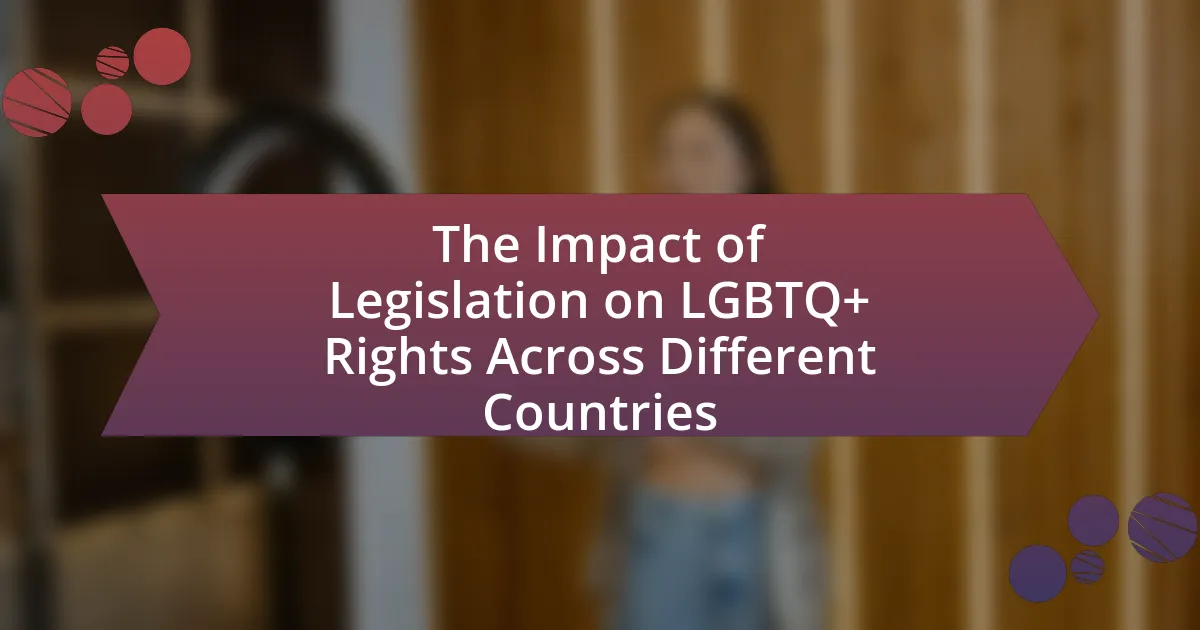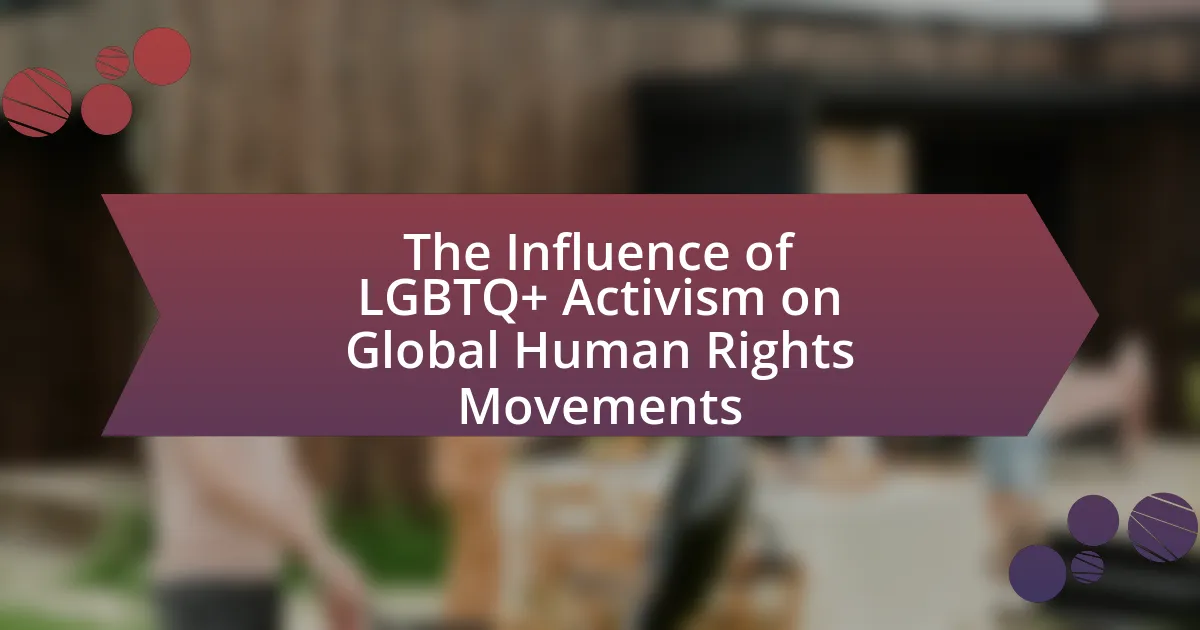Building allyship in LGBTQ+ activism involves actively supporting and advocating for the rights and dignity of LGBTQ+ individuals, addressing systemic inequalities, and amplifying marginalized voices. The article outlines the importance of allyship in fostering inclusion, combating discrimination, and promoting equality, highlighting its role in creating safer environments and improving mental health outcomes for LGBTQ+ individuals. Key characteristics of effective allies include empathy, active listening, and a commitment to advocacy, while practical steps for support involve education, participation in LGBTQ+ events, and challenging discriminatory behaviors. The article also discusses the challenges allies face, the significance of intersectionality, and strategies for maintaining commitment to LGBTQ+ causes.

What does it mean to build allyship in LGBTQ+ activism?
Building allyship in LGBTQ+ activism means actively supporting and advocating for the rights and dignity of LGBTQ+ individuals. This involves recognizing and addressing systemic inequalities, amplifying LGBTQ+ voices, and standing against discrimination. Effective allyship requires continuous education about LGBTQ+ issues, listening to the experiences of marginalized communities, and using one’s privilege to challenge oppressive systems. Research indicates that allyship can significantly impact social change, as allies can help create safer environments and foster acceptance, ultimately contributing to the advancement of LGBTQ+ rights.
Why is allyship important for LGBTQ+ communities?
Allyship is important for LGBTQ+ communities because it fosters inclusion, support, and advocacy, which are essential for combating discrimination and promoting equality. Allies amplify LGBTQ+ voices, challenge societal norms, and help create safe spaces, contributing to a more equitable society. Research indicates that supportive environments significantly improve mental health outcomes for LGBTQ+ individuals; for instance, a study published in the Journal of Counseling Psychology found that supportive relationships can reduce the risk of depression and anxiety among LGBTQ+ youth. Thus, allyship not only benefits LGBTQ+ individuals but also strengthens the overall fabric of society by promoting acceptance and understanding.
How does allyship contribute to social change?
Allyship contributes to social change by amplifying marginalized voices and fostering inclusive environments. When allies actively support LGBTQ+ individuals, they challenge systemic discrimination and promote equality, which can lead to policy changes and increased societal acceptance. For instance, research from the Human Rights Campaign indicates that workplaces with strong allyship programs report higher levels of employee satisfaction and lower turnover rates, demonstrating that allyship not only benefits individuals but also enhances organizational culture.
What role do allies play in supporting LGBTQ+ rights?
Allies play a crucial role in supporting LGBTQ+ rights by amplifying marginalized voices and advocating for equality. They contribute to social change by challenging discriminatory practices and policies, thereby fostering an inclusive environment. For instance, allies can participate in pride events, support LGBTQ+ organizations, and engage in conversations that promote understanding and acceptance. Research indicates that workplaces with active allyship programs report higher employee satisfaction and lower turnover rates, demonstrating the positive impact of ally involvement on community well-being.
What are the key characteristics of an effective ally?
An effective ally possesses key characteristics such as empathy, active listening, and a commitment to advocacy. Empathy allows allies to understand and share the feelings of marginalized individuals, fostering a deeper connection. Active listening ensures that allies hear and validate the experiences of those they support, which is crucial for building trust. A commitment to advocacy means that allies actively work to challenge discrimination and promote equality, often using their privilege to amplify marginalized voices. Research indicates that allies who engage in these behaviors contribute significantly to creating inclusive environments, as highlighted in studies on allyship in social movements.
How can allies demonstrate their support for LGBTQ+ individuals?
Allies can demonstrate their support for LGBTQ+ individuals by actively advocating for their rights and inclusion in various spaces. This includes participating in LGBTQ+ events, such as Pride parades, and using inclusive language that respects individuals’ identities. Research shows that visible allyship can significantly impact the mental health and well-being of LGBTQ+ individuals, as highlighted in a study published in the Journal of Homosexuality, which found that supportive environments reduce feelings of isolation and discrimination. Additionally, allies can educate themselves about LGBTQ+ issues and challenge discriminatory behaviors in their communities, reinforcing a culture of acceptance and equality.
What common mistakes should allies avoid?
Allies should avoid speaking over marginalized voices, as this undermines the very purpose of allyship. When allies dominate conversations, they diminish the opportunity for LGBTQ+ individuals to share their experiences and perspectives, which is crucial for authentic representation. Additionally, allies must refrain from making assumptions about the needs and identities of LGBTQ+ individuals; this can lead to misguided support that does not align with the community’s actual desires. Research indicates that effective allyship is rooted in active listening and understanding, rather than presuming to know what is best for others. Furthermore, allies should avoid performative activism, which is characterized by superficial gestures that lack genuine commitment to the cause. This can manifest in social media posts without follow-up actions, ultimately eroding trust within the community. By recognizing and addressing these common mistakes, allies can foster more meaningful and supportive relationships with LGBTQ+ individuals.

How can individuals become better allies to LGBTQ+ activism?
Individuals can become better allies to LGBTQ+ activism by actively educating themselves about LGBTQ+ issues and advocating for equality. This involves understanding the history, challenges, and rights of LGBTQ+ individuals, which can be achieved through reading literature, attending workshops, and engaging with LGBTQ+ communities. Research shows that informed allies can significantly impact social acceptance and policy changes, as seen in studies indicating that increased awareness leads to greater support for LGBTQ+ rights. Additionally, allies should use their platforms to amplify LGBTQ+ voices, challenge discriminatory behavior, and support LGBTQ+ organizations through donations or volunteer work, thereby contributing to a more inclusive society.
What practical steps can allies take to support LGBTQ+ causes?
Allies can support LGBTQ+ causes by actively advocating for equal rights and inclusion. This includes educating themselves about LGBTQ+ issues, using inclusive language, and challenging discriminatory behavior when they witness it. For instance, studies show that workplaces with inclusive policies see a 30% increase in employee satisfaction among LGBTQ+ individuals, highlighting the importance of allyship in fostering supportive environments. Additionally, allies can participate in LGBTQ+ events, donate to relevant organizations, and amplify LGBTQ+ voices on social media, thereby contributing to visibility and awareness.
How can allies educate themselves about LGBTQ+ issues?
Allies can educate themselves about LGBTQ+ issues by engaging with diverse educational resources, including books, documentaries, and online courses focused on LGBTQ+ history, rights, and experiences. For instance, reading “The Gay Revolution: The Story of the Struggle” by Lillian Faderman provides historical context and insights into the LGBTQ+ movement. Additionally, attending workshops and seminars hosted by LGBTQ+ organizations can enhance understanding and foster dialogue. Research indicates that individuals who participate in educational programs about LGBTQ+ issues demonstrate increased awareness and empathy, which are crucial for effective allyship.
What resources are available for allies to learn from?
Allies can access various resources to learn about supporting LGBTQ+ activism, including educational websites, books, workshops, and community organizations. Notable websites such as GLAAD and the Human Rights Campaign provide comprehensive guides and articles on allyship. Books like “The Gay Revolution: The Story of the Struggle” by Lillian Faderman offer historical context and insights into LGBTQ+ rights. Workshops and training sessions hosted by organizations like PFLAG and local LGBTQ+ centers equip allies with practical skills and knowledge. These resources collectively enhance understanding and foster effective allyship in supporting LGBTQ+ communities.
How can allies engage with LGBTQ+ communities effectively?
Allies can engage with LGBTQ+ communities effectively by actively listening to their needs and concerns. This involves creating safe spaces for open dialogue, where LGBTQ+ individuals feel comfortable sharing their experiences. Research indicates that 70% of LGBTQ+ individuals report feeling more supported when allies take the time to understand their perspectives (Human Rights Campaign, 2020). Additionally, allies should educate themselves about LGBTQ+ issues, advocate for inclusive policies, and participate in community events, demonstrating solidarity and commitment to equality. By doing so, allies not only amplify LGBTQ+ voices but also contribute to a more inclusive society.
What are the best practices for participating in LGBTQ+ events?
To effectively participate in LGBTQ+ events, individuals should prioritize respect, inclusivity, and active engagement. Respecting the identities and experiences of LGBTQ+ individuals is crucial; this includes using correct pronouns and avoiding assumptions about someone’s identity. Inclusivity involves creating a welcoming environment for all attendees, ensuring that diverse voices are heard and valued. Active engagement means participating in discussions, volunteering, and supporting LGBTQ+ organizations, which fosters community and solidarity.
Research indicates that allyship significantly enhances the visibility and support for LGBTQ+ rights, as highlighted in studies by the Human Rights Campaign, which emphasize the importance of ally involvement in advocacy efforts.
How can allies amplify LGBTQ+ voices in their networks?
Allies can amplify LGBTQ+ voices in their networks by actively listening to and sharing the experiences and perspectives of LGBTQ+ individuals. This involves creating platforms for LGBTQ+ voices, such as hosting discussions, sharing content on social media, and advocating for LGBTQ+ representation in decision-making processes. Research indicates that representation can significantly impact societal attitudes; for example, a study by the Williams Institute found that increased visibility of LGBTQ+ individuals in media correlates with greater acceptance and support from the general public. By prioritizing these actions, allies can effectively contribute to a more inclusive environment that elevates LGBTQ+ narratives.

What challenges do allies face in supporting LGBTQ+ activism?
Allies face several challenges in supporting LGBTQ+ activism, including societal backlash, lack of understanding, and potential alienation from their own communities. Societal backlash can manifest as discrimination or hostility towards allies who publicly support LGBTQ+ rights, which may deter individuals from taking a stand. Additionally, a lack of understanding about LGBTQ+ issues can lead to unintentional harm or misrepresentation, as allies may not fully grasp the complexities of the community’s needs and struggles. Furthermore, allies may experience alienation from their own social circles or communities, particularly if those groups hold anti-LGBTQ+ sentiments, creating a conflict between personal relationships and advocacy efforts. These challenges highlight the need for allies to educate themselves and navigate their support carefully to be effective advocates.
How can allies navigate resistance or backlash?
Allies can navigate resistance or backlash by actively listening to marginalized voices and responding with empathy and understanding. This approach fosters trust and demonstrates commitment to the cause, which is essential in overcoming opposition. Research indicates that allies who engage in open dialogue and seek to understand the experiences of those they support are more effective in creating inclusive environments. For instance, a study published in the Journal of Social Issues highlights that allies who prioritize communication and education can mitigate negative reactions and build stronger coalitions. By remaining informed about the issues at hand and adapting their strategies based on feedback, allies can effectively counteract resistance and promote positive change.
What strategies can allies use to address misconceptions about LGBTQ+ issues?
Allies can address misconceptions about LGBTQ+ issues by educating themselves and others through accurate information and open dialogue. By actively seeking knowledge about LGBTQ+ history, rights, and experiences, allies can dispel myths and stereotypes. For instance, studies show that individuals who engage in conversations about LGBTQ+ topics are more likely to challenge their own biases and those of others, leading to a more informed community. Additionally, allies can share personal stories from LGBTQ+ individuals, which humanizes the issues and fosters empathy. Research indicates that personal narratives are effective in changing perceptions, as they create a connection that statistics alone may not achieve.
How can allies maintain their commitment in the face of challenges?
Allies can maintain their commitment in the face of challenges by actively engaging in continuous education and self-reflection. This approach allows allies to understand the evolving dynamics of LGBTQ+ issues and the specific challenges faced by the community. For instance, research indicates that allies who participate in workshops and training sessions are better equipped to navigate difficult conversations and confront biases, thereby reinforcing their commitment. Additionally, allies should establish strong support networks with other allies and LGBTQ+ individuals, which can provide emotional resilience and shared strategies for advocacy. This collaborative effort is essential, as studies show that social support significantly enhances the effectiveness of allyship in challenging situations.
What role does intersectionality play in allyship?
Intersectionality plays a crucial role in allyship by recognizing that individuals experience multiple, overlapping identities that can affect their social experiences and access to resources. This understanding allows allies to address the unique challenges faced by marginalized groups, particularly within the LGBTQ+ community, where factors such as race, gender, socioeconomic status, and disability intersect. For example, research by Crenshaw (1989) highlights how Black women face discrimination that is not solely based on race or gender but on the combination of both, emphasizing the need for allies to adopt a nuanced approach that considers these intersections. By acknowledging and advocating for the diverse experiences within the LGBTQ+ spectrum, allies can create more inclusive and effective support systems that address the specific needs of individuals at these intersections.
How can allies support LGBTQ+ individuals from diverse backgrounds?
Allies can support LGBTQ+ individuals from diverse backgrounds by actively listening to their experiences and advocating for their rights. This involves creating inclusive spaces where LGBTQ+ voices are heard and respected, which is essential for fostering understanding and solidarity. Research indicates that 70% of LGBTQ+ individuals report feeling more accepted when allies engage in conversations about their identities and challenges. Additionally, allies can educate themselves on the unique issues faced by LGBTQ+ individuals from various cultural, racial, and socioeconomic backgrounds, thereby enhancing their ability to provide informed support.
What are the implications of intersectionality for allyship strategies?
Intersectionality significantly influences allyship strategies by highlighting the interconnected nature of social identities and the unique challenges faced by individuals at these intersections. This understanding necessitates that allies adopt a more nuanced approach, recognizing that experiences of discrimination and privilege vary widely among individuals within the LGBTQ+ community based on factors such as race, gender, socioeconomic status, and ability. For instance, a study by Crenshaw (1989) introduced the concept of intersectionality, illustrating how overlapping identities can compound discrimination, thereby emphasizing the need for allies to engage in active listening and tailored support that addresses specific needs. Consequently, effective allyship requires a commitment to understanding these complexities and advocating for policies and practices that promote equity across diverse identities within the LGBTQ+ spectrum.
What are some effective tips for being a supportive ally?
To be a supportive ally, actively listen to LGBTQ+ individuals and validate their experiences. This involves creating a safe space for open dialogue, where individuals feel comfortable sharing their thoughts and feelings without fear of judgment. Research indicates that supportive listening can significantly enhance trust and communication, fostering stronger relationships within marginalized communities. Additionally, educating oneself about LGBTQ+ issues and terminology is crucial, as it demonstrates commitment and respect. Studies show that informed allies can effectively challenge stereotypes and advocate for equality, thereby contributing to a more inclusive environment. Engaging in advocacy, whether through participating in events or amplifying LGBTQ+ voices on social media, further solidifies allyship and shows solidarity in the fight for rights and recognition.
How can allies create inclusive environments in their communities?
Allies can create inclusive environments in their communities by actively advocating for LGBTQ+ rights and fostering open dialogue. This involves educating themselves about LGBTQ+ issues, using inclusive language, and challenging discriminatory behaviors when they occur. Research indicates that communities with visible allyship experience lower rates of discrimination and increased acceptance, as seen in studies conducted by the Human Rights Campaign, which found that 70% of LGBTQ+ individuals feel more supported in environments where allies are vocal and engaged. By participating in local LGBTQ+ events and supporting inclusive policies, allies can significantly contribute to a culture of acceptance and belonging.
What ongoing actions can allies take to sustain their support?
Allies can sustain their support by actively engaging in continuous education about LGBTQ+ issues and advocating for inclusive policies. Continuous education allows allies to understand the evolving challenges faced by the LGBTQ+ community, which is essential for effective advocacy. For instance, participating in workshops, reading relevant literature, and following LGBTQ+ organizations on social media can provide allies with updated information and perspectives. Additionally, advocating for inclusive policies, such as supporting anti-discrimination laws and promoting diversity in workplaces, demonstrates a commitment to creating a supportive environment. Research shows that workplaces with inclusive policies see a 35% increase in employee engagement, highlighting the positive impact of allyship on community well-being.
